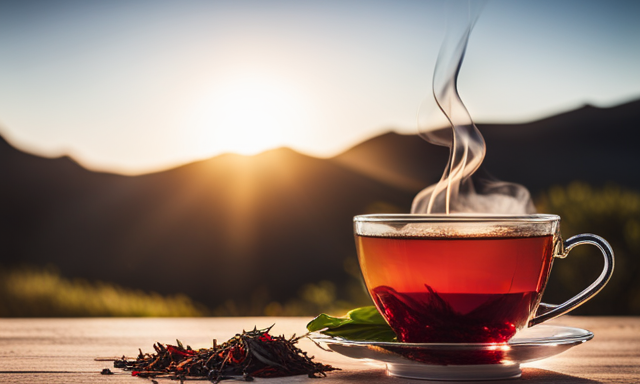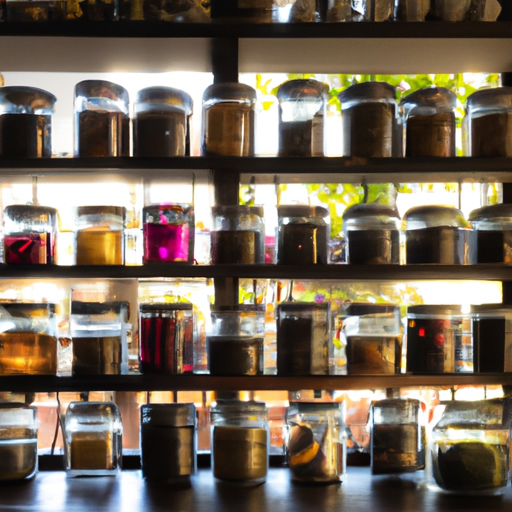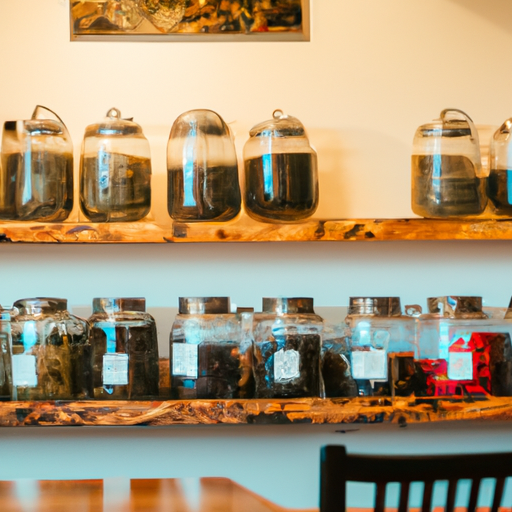As I sit here, the moon casting a gentle glow through my window, I can’t help but reflect on the importance of a good night’s sleep. We all know the frustration of tossing and turning, the exhaustion that follows us throughout the day.
But fear not, for I have discovered the secret to a restful slumber: herbal tea. Yes, my friends, nature has provided us with a remedy that soothes both body and mind. In this article, we will explore the best herbal teas for a blissful sleep, each one carefully selected for its calming properties.
From the delicate chamomile to the invigorating peppermint, these teas will transport you to a state of tranquility. So, join me on this journey as we delve into the world of herbal teas, unlocking the power of nature to guide us towards a night of deep, uninterrupted rest.
Key Takeaways
- Chamomile tea promotes relaxation, reduces anxiety, and enhances sleep quality.
- Lemon balm tea helps relax and unwind before bed, relieves anxiety, and improves cognitive function.
- Passionflower tea aids in insomnia and anxiety, increases GABA levels in the brain, and promotes the release of serotonin.
- Ashwagandha tea reduces stress and cortisol levels, promotes calm and relaxation, and aids in restful sleep.
Chamomile Tea
If you’re looking for a tea that’ll help you drift off into dreamland, chamomile tea is the way to go! Chamomile tea has been used for centuries as a natural sleep aid, and it’s no wonder why. This herbal infusion is known for its calming properties, which can help promote relaxation and improve sleep quality.
One of the key benefits of chamomile tea is its ability to reduce anxiety and stress. It contains an antioxidant called apigenin, which binds to certain receptors in the brain that may help initiate sleepiness and reduce insomnia symptoms. Additionally, chamomile tea has anti-inflammatory properties that can soothe the nervous system and promote a sense of calm.
To make chamomile tea, simply steep a chamomile tea bag or dried chamomile flowers in hot water for about 5 minutes. You can also get creative and try adding ingredients like honey, lemon, or lavender for added flavor and relaxation benefits.
In conclusion, chamomile tea is an excellent choice for a good night’s sleep. Its numerous benefits, including its ability to reduce anxiety and promote relaxation, make it a popular herbal remedy for those seeking a restful night’s sleep. So grab a cup of chamomile tea before bed and let its soothing properties guide you into a peaceful slumber.
Lavender Tea
Lavender tea is known to promote relaxation and help you unwind after a long day. This delightful herbal tea isn’t only soothing but also offers a range of benefits for a good night’s sleep. Here are some lavender tea benefits:
-
Reduces anxiety and stress: Lavender has long been used for its calming properties. Drinking lavender tea can help reduce anxiety and promote relaxation, making it easier to fall asleep.
-
Improves sleep quality: The aroma of lavender has been shown to improve sleep quality. Sipping on a warm cup of lavender tea before bed can help you achieve a more restful night’s sleep.
-
Eases insomnia: Lavender tea has been found to ease insomnia symptoms, helping individuals who struggle with falling or staying asleep.
To brew lavender tea, simply steep 1-2 teaspoons of dried lavender flowers in hot water for about 5-10 minutes. Strain the tea and enjoy its soothing aroma and gentle flavor. Incorporating lavender tea into your bedtime routine may just be the key to a peaceful night’s sleep.
Valerian Root Tea
Valerian Root Tea is a natural sedative that can help me fall asleep faster and achieve a deeper sleep. Studies have shown that valerian root can increase levels of a neurotransmitter called GABA, which helps to calm the brain and promote relaxation.
By drinking valerian root tea before bed, I can experience the benefits of this herbal remedy and enjoy a restful night’s sleep.
Acts as a Natural Sedative
To ensure a restful night’s sleep, chamomile tea gently wraps you in its soothing embrace, like a cozy blanket on a cool winter evening. Chamomile tea has long been regarded as one of the best herbal remedies for promoting sleep and relaxation.
This natural sedative has been used for centuries in traditional medicine and alternative therapies to calm the mind and induce a state of tranquility. Scientific studies have shown that chamomile tea contains compounds that bind to receptors in the brain, promoting relaxation and reducing anxiety. It also has anti-inflammatory properties that can help ease muscle tension and promote a sense of calmness.
So, if you’re looking for a natural remedy to help you drift off into a peaceful slumber, chamomile tea is the perfect choice.
Aids in Falling Asleep Faster and Deeper
Immerse yourself in the soothing embrace of chamomile tea, allowing it to gently lull you into a deep and peaceful slumber. Chamomile tea is renowned for its ability to aid in falling asleep faster and promoting deep sleep. Its natural sedative properties help relax the body and mind, preparing you for a restful night’s sleep.
Research has shown that chamomile tea contains compounds that bind to certain receptors in the brain, promoting relaxation and reducing anxiety. This can lead to a quicker onset of sleep and a longer duration of deep sleep, which is crucial for overall well-being.
To further emphasize the benefits of chamomile tea, I have created a table below:
| Benefit | Description |
|---|---|
| Aids in falling asleep | Chamomile tea helps you fall asleep faster, reducing sleep onset time. |
| Promotes deep sleep | It enhances the quality of sleep, allowing for more restorative rest. |
Incorporating chamomile tea into your nighttime routine can be a simple yet effective way to improve your sleep quality and wake up feeling refreshed and rejuvenated.
Peppermint Tea
Peppermint tea is a fantastic option for those looking to relieve muscle tension and digestive discomfort before bed. Its natural compounds have been shown to have soothing effects on the muscles, helping to relax and reduce tension.
Additionally, peppermint tea has been used for centuries to promote digestion and ease digestive discomfort, making it an excellent choice for those who may experience bloating or indigestion before sleep.
Lastly, the calming aroma and taste of peppermint tea can help promote relaxation, creating the perfect environment for a restful night’s sleep.
Relieves Muscle Tension and Digestive Discomfort
If you’re looking to unwind and soothe your body after a long day, chamomile tea can help relieve muscle tension and digestive discomfort. This herbal tea has been used for centuries due to its calming properties and ability to promote relaxation.
Chamomile tea contains compounds that have been shown to reduce muscle spasms and cramps, making it an excellent choice for those experiencing muscle tension. Additionally, chamomile has been found to improve digestion by soothing the digestive tract and reducing inflammation.
Here are five reasons why chamomile tea is the best choice for relieving muscle tension and digestive discomfort:
-
Relieves menstrual cramps: Chamomile tea has traditionally been used to alleviate the pain and discomfort associated with menstrual cramps.
-
Reduces bloating: Chamomile tea can help reduce bloating and gas by relaxing the muscles in the digestive system.
-
Eases indigestion: This herbal tea has been shown to soothe indigestion and promote healthy digestion.
-
Calms an upset stomach: Chamomile tea is known for its calming effect on the stomach, making it a natural remedy for an upset stomach.
-
Improves sleep quality: Drinking chamomile tea before bed can help you relax and improve the quality of your sleep.
Incorporating chamomile tea into your nightly routine can provide you with the relaxation and relief you need for a good night’s sleep.
Promotes Relaxation for a Restful Sleep
Drinking chamomile tea before bed creates a serene atmosphere, helping you drift off into a peaceful slumber. Chamomile tea has been used for centuries as a natural remedy for promoting relaxation and improving sleep quality. The tea contains compounds like apigenin, which binds to certain receptors in the brain that may promote sleepiness and reduce anxiety. Additionally, chamomile tea promotes mindfulness, allowing you to focus on the present moment and relieve any racing thoughts that may be keeping you awake. By incorporating chamomile tea into your bedtime routine, you can improve your sleep hygiene and create a calming ritual that signals to your body and mind that it’s time to unwind. To further emphasize the benefits of chamomile tea, consider the following table:
| Chamomile Tea Benefits |
|---|
| Promotes relaxation |
| Reduces anxiety |
| Enhances sleep quality |
| Improves sleep hygiene |
| Supports mindfulness |
By incorporating chamomile tea into your nightly routine, you can create a tranquil environment conducive to a restful night’s sleep.
Lemon Balm Tea
To ensure a restful night’s sleep, you should consider trying lemon balm tea. It can help you relax and unwind before bed. Lemon balm tea has numerous benefits, including anxiety relief and improved cognitive function. Research has shown that lemon balm tea can help reduce anxiety levels by promoting relaxation and calmness. It contains compounds that interact with certain receptors in the brain, which can help alleviate symptoms of anxiety.
Additionally, lemon balm tea has been found to have positive effects on cognitive function. It can enhance memory and attention, making it a great choice for those struggling with cognitive issues. By incorporating lemon balm tea into your bedtime routine, you can enjoy a peaceful night’s sleep while also benefiting from its anxiety-relieving and cognitive-enhancing properties.
Passionflower Tea
Passionflower tea, known for its calming properties, can transport you to a state of relaxation and tranquility, allowing you to effortlessly drift into a peaceful slumber. This herbal tea has been used for centuries as a natural remedy for insomnia and anxiety. The passionflower plant contains compounds that have been shown to increase levels of gamma-aminobutyric acid (GABA) in the brain, a neurotransmitter that helps regulate sleep. Additionally, passionflower tea may also help reduce anxiety by promoting the release of serotonin, a hormone that contributes to feelings of well-being and happiness.
To fully experience the benefits of passionflower tea, it is important to follow the recommended dosage. Typically, a cup of passionflower tea made from one teaspoon of dried herb steeped in hot water for 10 minutes is sufficient. However, it is advisable to consult with a healthcare professional before starting any herbal treatment. With its calming effects and natural compounds, passionflower tea can be a soothing and effective option for those seeking a restful night’s sleep.
| Benefits of Passionflower Tea | Dosage |
|---|---|
| Promotes relaxation | 1 tsp |
| Reduces anxiety | |
| Aids in sleep regulation |
Ashwagandha Tea
I’ve found that Ashwagandha tea is a wonderful herbal remedy for reducing stress and cortisol levels. It contains compounds that’ve been shown to lower the levels of this stress hormone in the body, helping to promote a sense of calm and relaxation.
Additionally, Ashwagandha tea has been known to promote restful sleep, making it an excellent choice for those who struggle with insomnia or difficulty falling asleep.
Reduces Stress and Cortisol Levels
Chamomile tea is known for its calming properties, and studies have shown that it can help reduce stress and lower cortisol levels by up to 32%. Here are four reasons why chamomile tea is a great herbal remedy for a good night’s sleep:
-
Reduces anxiety: Chamomile tea contains compounds that bind to certain receptors in the brain, promoting relaxation and reducing feelings of anxiety.
-
Promotes calmness: The mild sedative properties of chamomile tea can help calm the mind and body, making it easier to fall asleep and stay asleep throughout the night.
-
Natural sleep aid: Chamomile tea acts as a gentle sleep aid, helping to improve the overall quality of sleep without causing any grogginess or dependence.
-
Anti-inflammatory properties: Chamomile tea has anti-inflammatory effects, which can help soothe any underlying inflammation that may be interfering with sleep.
Incorporating chamomile tea into your nighttime routine can be a simple and effective way to promote a good night’s sleep and wake up feeling refreshed.
Promotes Relaxation and Restful Sleep
With its ability to induce a state of tranquility and promote a restorative slumber, this botanical infusion is the perfect addition to your evening routine.
Herbal tea has long been known for its calming properties, and certain varieties have been specifically shown to promote relaxation and restful sleep.
Chamomile, for example, contains compounds that bind to certain receptors in the brain, reducing anxiety and promoting overall well-being.
Lavender tea, on the other hand, has been found to improve sleep patterns by increasing slow-wave sleep, the stage associated with deep rest and rejuvenation.
By incorporating these herbal teas into your nightly ritual, you can experience a more peaceful and refreshing sleep, waking up feeling rejuvenated and ready to take on the day.
So, sip on a cup of herbal tea and let its natural goodness guide you to a night of quality rest.
Valerian and Lemon Balm Blend
I’ve discovered a fantastic herbal tea blend that combines the benefits of valerian root and lemon balm. This powerful combination not only enhances sleep quality but also reduces symptoms of insomnia.
Valerian root is well-known for its calming effects, while lemon balm has been used for centuries as a natural remedy for anxiety and insomnia. Together, they create a soothing and relaxing blend that can help promote a good night’s sleep.
Combines the Benefits of Valerian Root and Lemon Balm
Looking for a bedtime brew that’ll knock you out faster than an elephant tranquilizer? Try a herbal tea that cleverly combines the calming effects of valerian root and lemon balm.
Valerian root is known for its ability to improve sleep quality and reduce the time it takes to fall asleep. It’s been used for centuries as a natural remedy for insomnia and anxiety.
On the other hand, lemon balm is known for its relaxing and mood-enhancing effects. It can help calm the mind and promote a sense of tranquility.
By combining these two powerful herbs, you can enjoy the benefits of both in one soothing cup of tea.
So, if you’re looking for a natural way to improve your sleep, give this valerian root and lemon balm blend a try. You won’t be disappointed.
Enhances Sleep Quality and Reduces Insomnia Symptoms
Experience a restful and rejuvenating slumber with the powerful blend of valerian root and lemon balm. This herbal tea not only enhances sleep quality but also reduces insomnia symptoms, allowing you to wake up feeling refreshed and energized.
Sleep is essential for our overall health, and incorporating good sleep hygiene practices can greatly improve our well-being. Sleep hygiene tips, such as establishing a consistent sleep schedule, creating a comfortable sleep environment, and practicing relaxation techniques before bed, can further enhance the effects of valerian root and lemon balm tea. By following these tips, you can optimize your sleep and promote better overall health.
Research has shown that getting enough sleep is crucial for our physical and mental health. It helps regulate our mood, improves cognitive function, and strengthens our immune system. By prioritizing a good night’s sleep and incorporating valerian root and lemon balm tea into your bedtime routine, you can experience the profound benefits of restful sleep and wake up ready to take on the day.
Frequently Asked Questions
Are there any potential side effects or risks associated with consuming herbal teas for better sleep?
When it comes to herbal teas for better sleep, it’s important to be aware of potential side effects and risks. Some teas may cause drowsiness, while others can lead to digestive issues or interact with medications.
Can herbal teas be used as a long-term solution for sleep problems, or are they only effective for occasional use?
Herbal teas can be used as a long-term solution for sleep problems. While they are effective for occasional use, studies show that consistent consumption of certain herbal teas can improve sleep quality over time.
Is it safe to consume herbal teas for sleep if I am taking medication or have a pre-existing medical condition?
When consuming herbal teas for sleep, it is important to take safety precautions. There can be interactions between herbal teas and medications, so it is best to consult with a healthcare professional.
How long before bedtime should I drink herbal tea to promote better sleep?
To promote better sleep, it’s best to drink herbal tea about an hour before bedtime. The benefits of drinking herbal tea for better sleep include relaxation and soothing effects. The best herbal tea ingredients for promoting restful sleep are chamomile, lavender, and valerian root.
Are there any specific instructions or guidelines for brewing herbal teas to maximize their sleep benefits?
To maximize the sleep benefits of herbal teas, it’s important to follow proper brewing techniques. Use hot water, steep for 5-10 minutes, and cover the cup to retain the aroma. Experiment with the best herbal blends for your personal preference.
Conclusion
In conclusion, when it comes to choosing the best herbal tea for a good night’s sleep, there are several options available.
Chamomile tea, with its soothing properties, has long been a popular choice for those seeking a relaxing bedtime ritual.
Lavender tea, known for its calming effects, can also promote a restful sleep.
Valerian root tea has been used for centuries to alleviate insomnia and improve sleep quality.
Peppermint tea and lemon balm tea, on the other hand, can help to reduce anxiety and promote relaxation.
Passionflower tea, with its sedative properties, has also been found to aid in sleep.
And lastly, the combination of valerian and lemon balm in a blend has been shown to have a synergistic effect on improving sleep quality.
So, whether you prefer the gentle aroma of chamomile or the soothing taste of lavender, there is an herbal tea out there to help you drift off into a peaceful slumber.
Imagine your sleep as a delicate flower, in need of nurturing and care. Just as a flower needs the right amount of sunlight, water, and nutrients to thrive, your sleep requires the right ingredients to flourish.
Herbal teas, with their natural calming properties, can provide the gentle touch needed to help your sleep blossom. So, next time you find yourself tossing and turning, reach for a cup of herbal tea and watch as your sleep transforms into a beautiful, restful experience.
Sweet dreams!










